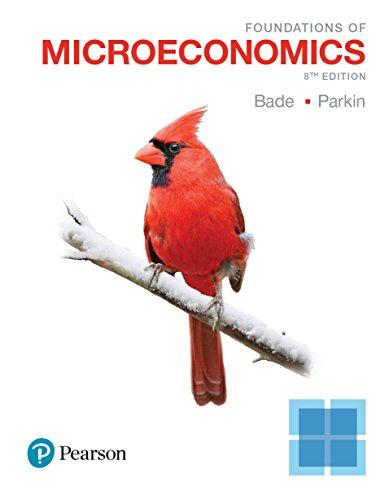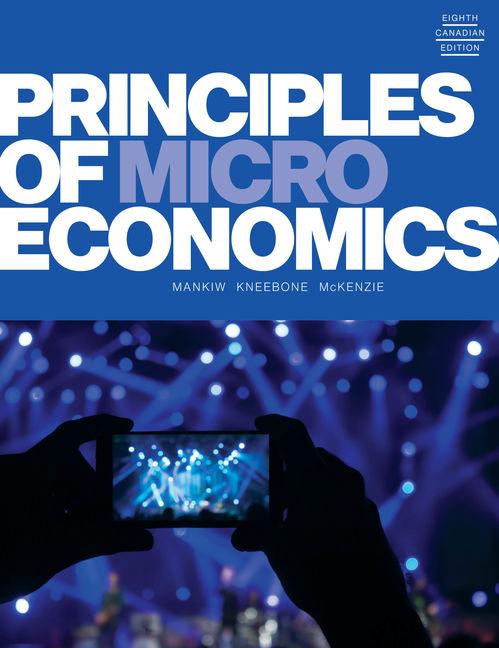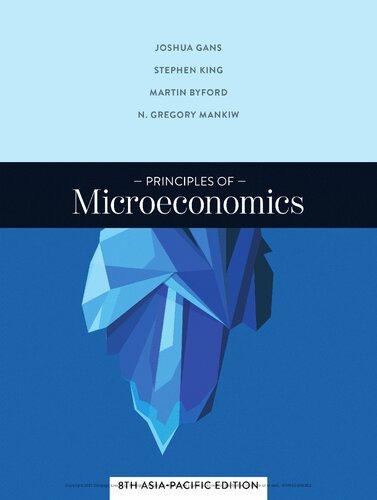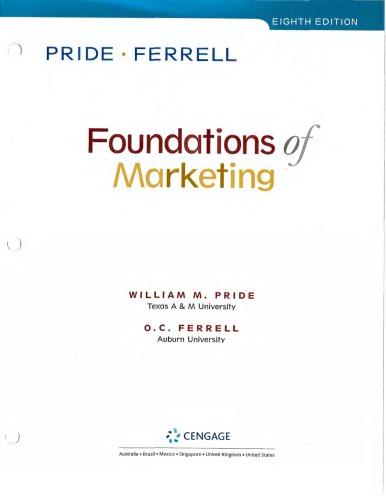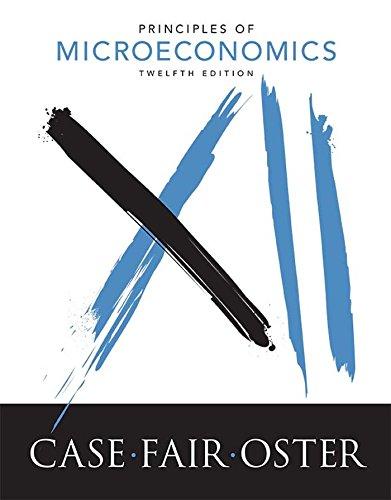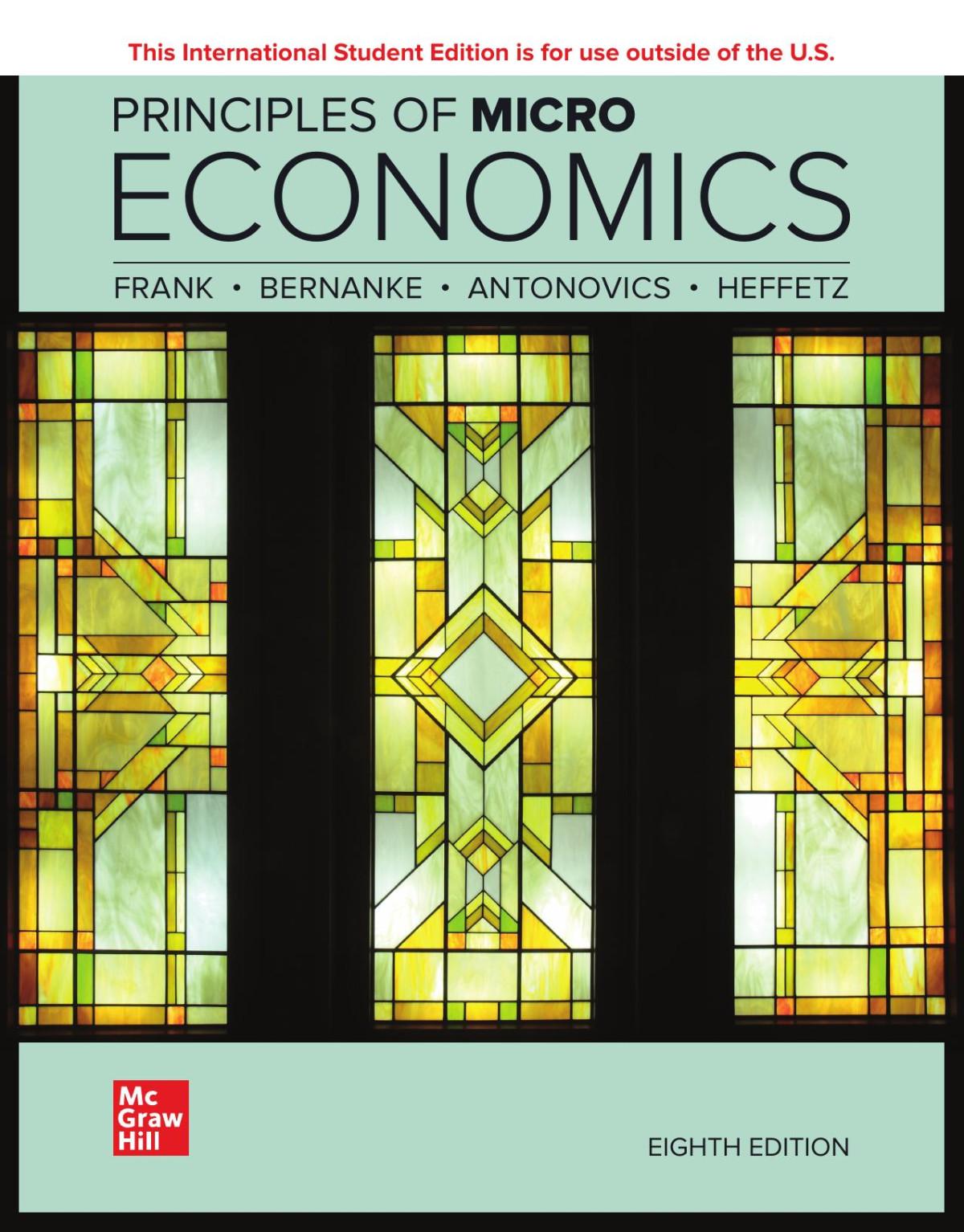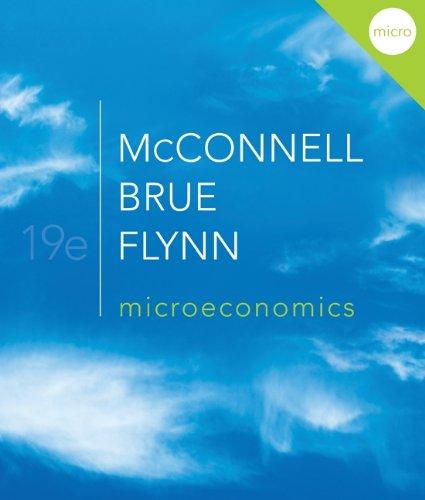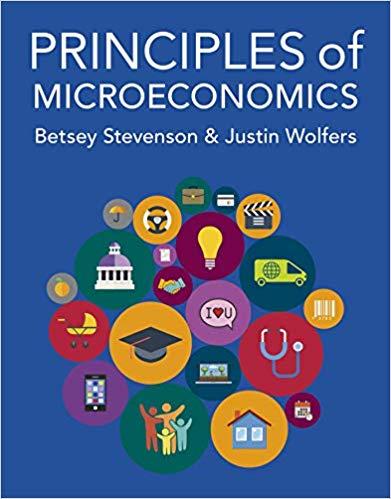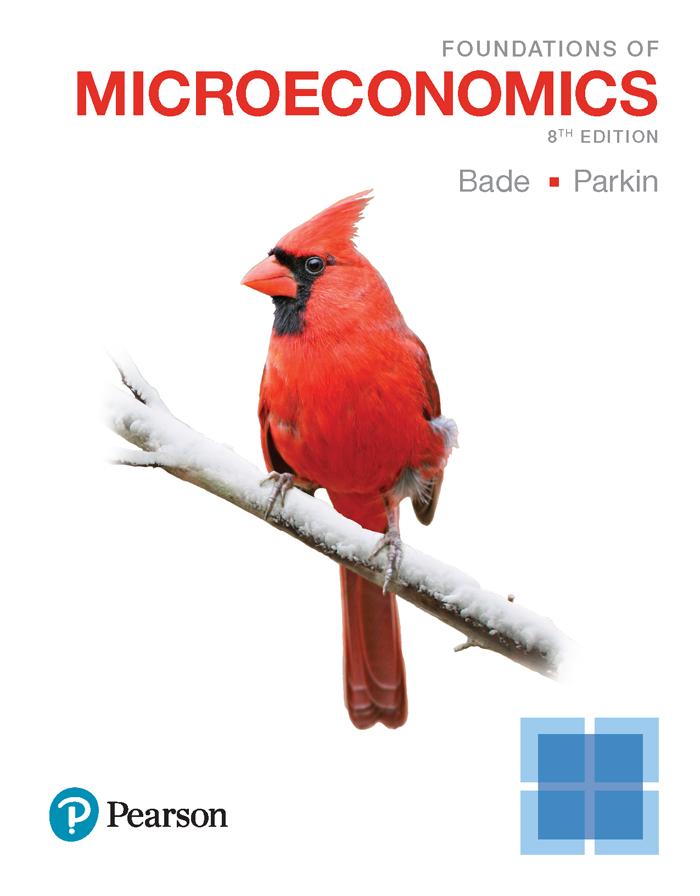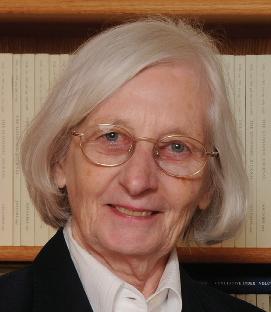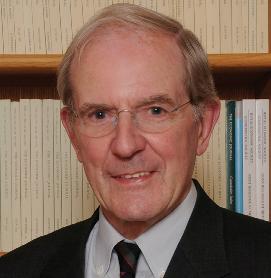PaRt 2 a ClosER look at MaRkEts
CHAPTER 5
Elasticities of Demand and Supply 113
CHAPTER CHECkLIST 113
5.1
The Price Elasticity of Demand 114
Percentage Change in Price 114
Percentage Change in Quantity Demanded 115
Comparing the Percentage Changes in Price and Quantity 115
Elastic and Inelastic Demand 116
Influences on the Price Elasticity of Demand 116
Computing the Price Elasticity of Demand 118
Interpreting the Price Elasticity of Demand Number 119
Elasticity Along a Linear Demand Curve 120
Total Revenue and the Price Elasticity of Demand 122
CHECkPOINT 5. 1 125
5.2 The Price Elasticity of Supply 126
Elastic and Inelastic Supply 126
Influences on the Price Elasticity of Supply 126
Computing the Price Elasticity of Supply 128
CHECkPOINT 5. 2 130
5.3 Cross Elasticity and Income Elasticity 131
Cross Elasticity of Demand 131
Income Elasticity of Demand 132
CHECkPOINT 5. 3 134
CHAPTER SUMMARY 135
CHAPTER CHECkPOINT 136
■ EYE on the GLOBAL ECONOMY
Price Elasticities of Demand 121
■ EYE on ELASTICITY AT THE COFFEE SHOP
What Do You Do When Starbucks Raises the Price of a Latte? 123
■ EYE on the U.S. ECONOMY
Two Applications of the Price Elasticity of Demand 124
■ EYE on YOUR LIFE
Your Price Elasticities of Demand 133
CHAPTER 6
Efficiency and Fairness of Markets 139
CHAPTER CHECkLIST 139
6.1 Allocation Methods and Efficiency 140
Resource Allocation Methods 140
Using Resources Efficiently 143
CHECkPOINT 6. 1 147
6.2 value, Price, and Consumer Surplus 148
Demand and Marginal Benefit 148
Consumer Surplus 149
CHECkPOINT 6. 2 150
6.3 Cost, Price, and Producer Surplus 151
Supply and Marginal Cost 151
Producer Surplus 152
CHECkPOINT 6. 3 153
6.4 Are Markets Efficient? 154
Marginal Benefit Equals Marginal Cost 154
Total Surplus Is Maximized 155
The Invisible Hand 155
Market Failure 157
Sources of Market Failure 158
Alternatives to the Market 159
CHECkPOINT 6. 4 160
6.5 Are Markets Fair? 161
It’s Not Fair If the Rules Aren’t Fair 161
It’s Not Fair If the Result Isn’t Fair 161
Compromise 163
CHECkPOINT 6. 5 164
CHAPTER SUMMARY 165
CHAPTER CHECkPOINT 166
■ EYE on the U.S. ECONOMY
The Invisible Hand and e-Commerce 156
■ EYE on PRICE GOUGING
Should Price Gouging Be Illegal? 162
■ EYE on YOUR LIFE
Allocation Methods, Efficiency, and Fairness 163
CHAPTER 7
Government Actions in Markets 169
CHAPTER CHECkLIST 169
7.1 Price Ceilings 170
A Rent Ceiling 170
Are Rent Ceilings Efficient? 173
Are Rent Ceilings Fair? 174
If Rent Ceilings Are So Bad, Why Do We Have Them? 174
CHECkPOINT 7. 1 175
7.2 Price Floors 176
The Minimum Wage 177 Is the Minimum Wage Efficient? 180 Is the Minimum Wage Fair? 181 If the Minimum Wage Is So Bad, Why Do We Have It? 181
CHECkPOINT 7. 2 182
7.3 Production Quotas 183
Production Quota: An Example 183
CHECkPOINT 7. 3 186
CHAPTER SUMMARY 187
CHAPTER CHECkPOINT 188
■ EYE on the U.S. ECONOMY Minimum Wages and Employment 179
■ EYE on PRICE REGULATION
Can Congress Repeal the Law of Market Forces? 181
■ EYE on the GLOBAL ECONOMY
Production Quotas 183
■ EYE on YOUR LIFE
Price Ceilings and Price Floors You Encounter 185
CHAPTER 8
Taxes 191
CHAPTER CHECkLIST 191
8.1 Taxes on Buyers and Sellers 192
Tax Incidence 192
Taxes and Efficiency 193 Tax Burden 194
Incidence, Inefficiency, and Elasticity 194
Incidence, Inefficiency, and the Elasticity of Demand 195
Incidence, Inefficiency, and the Elasticity of Supply 196
CHECkPOINT 8. 1 197
8.2 Income Taxes and Social Security Taxes 198
The Effects of the Income Tax 198
The Social Security Tax 202
CHECkPOINT 8. 2 205
8.3 Fairness and the Big Tradeoff 206
The Benefits Principle 206
The Ability-to-Pay Principle 206
Ability to Pay and Tax Progressivity 207
The Big Tradeoff and Alternative Tax Proposals 207
CHECkPOINT 8. 3 210
CHAPTER SUMMARY 211
CHAPTER CHECkPOINT 212
■ EYE on the U.S. ECONOMY
Taxes in the United States Today 199
■ Eye on CONGRESS
Does Congress Decide Who Pays the Taxes? 203
■ EYE on the PAST
The Origins and History of the U.S. Income Tax 204
■ EYE on YOUR LIFE
Tax Freedom Day 204
■ EYE on the U.S. ECONOMY
The Progressive Income Tax 208
CHAPTER 9
Global Markets in Action 215
CHAPTER CHECkLIST 215
9.1 How Global Markets Work 216
International Trade Today 216
What Drives International Trade? 216
Why the United States Imports T-Shirts 218
Why the United States Exports Airplanes 219
CHECkPOINT 9. 1 220
9.2 Winners, Losers, and Net Gains From Trade 221
Gains and Losses from Imports 222
Gains and Losses from Exports 223
CHECkPOINT 9. 2 224
9.3 International Trade Restrictions 225
Tariffs 225
Import Quotas 229
Other Import Barriers 231
Export Subsidies 231
CHECkPOINT 9. 3 232
9.4 The Case Against Protection 233
Three Traditional Arguments for Protection 233
Four Newer Arguments for Protection 235
CHAPTER 10
Externalities 243
CHAPTER CHECkLIST 243
Externalities in our Daily Lives 244
Negative Production Externalities 244
Positive Production Externalities 244
Negative Consumption Externalities 245
Positive Consumption Externalities 245
10.1 Negative Externalities: Pollution 246
Private Costs and Social Costs 246
Production and Pollution: How Much? 248
Establish Property Rights 249
Mandate Clean Technology 251
Tax or Cap and Price Pollution 251
CHECkPOINT 10. 1 256
10.2 Positive Externalities: Education 257
Private Benefits and Social Benefits 257
Government Actions in the Face of External Benefits 259
CHECkPOINT 10. 2 262
CHAPTER SUMMARY 263
CHAPTER CHECkPOINT 264
■ EYE on YOUR LIFE
Externalities in Your Life 245
■ EYE on the U.S. ECONOMY
Why Is International Trade Restricted? 236
CHECkPOINT 9. 4 238
CHAPTER SUMMARY 239
CHAPTER CHECkPOINT 240
■ EYE on the U.S. ECONOMY
U.S. Exports and Imports 217
■ Eye on GLOBALIZATION
Who Wins and Who Loses from Globalization? 221
■ EYE on the PAST
The History of U.S. Tariffs 225
■ EYE on YOUR LIFE
International Trade 237
U.S. Air Pollution Trends 253 PaRt 4 MaRkEt FailuRE and PubliC PoliCy
■ EYE on CLIMATE CHANGE
How Can We Limit Carbon Emissions? 254
CHAPTER 11
Public Goods and Common Resources 267
CHAPTER CHECkLIST 267
11.1 Classifying Goods and Resources 268 Excludable 268
Rival 268
A Fourfold Classification 268
CHECkPOINT 11. 1 270
11.2 Public Goods and The Free-Rider Problem 271
The Free-Rider Problem 271
The Marginal Benefit from a Public Good 272
The Marginal Cost of a Public Good 272
The Efficient Quantity of a Public Good 274
Private Provision: Underproduction 274
Public Provision: Efficient Production 275
Obstacles to Efficient Public Provision 276
CHECkPOINT 11. 2 279
11.3 The Tragedy of The Commons 280
Unsustainable Use of a Common Resource 280
Inefficient Use of a Common Resource 281
Using the Commons Efficiently 284
CHECkPOINT 11. 3 288
CHAPTER SUMMARY 289
CHAPTER CHECkPOINT 290
■ EYE on the PAST
Is a Lighthouse a Public Good? 270
■ EYE on YOUR LIFE
A Student’s Free-Rider Problem and a Market Solution 271
■ EYE on the U.S. INFRASTRUCTURE
Should America Spend More on Transportation Infrastructure? 278
■ EYE on the PAST
The Commons of England’s Middle Ages 280
■ EYE on the GLOBAL ECONOMY
The North Atlantic Cod Tragedy of the Commons 282
■ EYE on the GLOBAL ECONOMY
ITQs Work 287
CHAPTER 12
Private Information and Healthcare Markets 293
CHAPTER CHECkLIST 293
12.1 The Lemons Problem and its Solution 294
A Market for Used Cars with a Lemons Problem 294
A Used-Car Market with Dealers’ Warranties 298
CHECkPOINT 12. 1 300
12.2 Information Problems in Insurance
Markets 301
Insurance Markets 301
Asymmetric Information in Insurance 302
Screening in Insurance Markets 304
Separating Equilibrium with Screening 304
CHECkPOINT 12. 2 306
12.3 The Economics of Healthcare 307
Healthcare Market Failure 307
Alternative Public Choice Solutions 310
A Reform Idea? 312
CHECkPOINT 12. 3 314
CHAPTER SUMMARY 315
CHAPTER CHECkPOINT 316
■ EYE on the MARkET FOR USED CARS
How Do You Avoid Buying a Lemon? 298
■ EYE on the U.S. ECONOMY
Insurance in the United States 301
■ EYE on the U.S. ECONOMY
Healthcare in the United States: A Snapshot 308
■ EYE on the GLOBAL ECONOMY
Healthcare Expenditures and Health Outcomes 311
■ EYE on YOUR LIFE
Signaling Your Ability 313
PaRt 5 a ClosER look at dECision MakERs
CHAPTER 13
Consumer Choice and Demand 319
CHAPTER CHECkLIST 319
13.1 Consumption Possibilities 320
The Budget Line 320
A Change in the Budget 321 Changes in Prices 322
Prices and the Slope of the Budget Line 323
CHECkPOINT 13. 1 325
13.2 Marginal Utility Theory 326
Total Utility 326
Marginal Utility 326
Graphing Tina’s Utility Schedules 328
Maximizing Total Utility 328
Finding an Individual Demand Curve 330
CHECkPOINT 13. 2 332
13.3 Efficiency, Price, and value 333
Consumer Efficiency 333
The Paradox of Value 333
CHECkPOINT 13. 3 336
CHAPTER SUMMARY 337
CHAPTER CHECkPOINT 338
Appendix: Indifference Curves 341
An Indifference Curve 341
Marginal Rate of Substitution 342
Consumer Equilibrium 343
Deriving the Demand Curve 344
APPENDIx CHECkPOINT 346
■ EYE on the U.S. ECONOMY
Relative Prices on the Move 324
■ EYE on the PAST
Jeremy Bentham, William Stanley Jevons, and the Birth of Utility 327
■ EYE on SONG DOWNLOADS AND STREAMING
How Much Would You Pay for a Song? 334
■ EYE on YOUR LIFE
Do You Maximize Your Utility? 336
CHAPTER 14
Production and Cost 347
CHAPTER CHECkLIST 347
14.1 Economic Cost and Profit 348
The Firm’s Goal 348
Accounting Cost and Profit 348
Opportunity Cost 348
Economic Profit 349
CHECkPOINT 14. 1 351
Short Run and Long Run 352
CHAPTER 15
Perfect Competition 375
CHAPTER CHECkLIST 375
Market Types 376
Perfect Competition 376
Other Market Types 376
15.1 A Firm’s Profit-Maximizing Choices 377
Price Taker 377
Revenue Concepts 377
Profit-Maximizing Output 378
Marginal Analysis and the Supply Decision 380
Temporary Shutdown Decision 381
The Firm’s Short-Run Supply Curve 382
CHECkPOINT 15. 1 384
15.2 Output, Price, and Profit In The Short Run 385
Market Supply in the Short Run 385
Short-Run Equilibrium in Normal Times 386
14.2 Short-Run Production 353
Total Product 353
Marginal Product 354
Average Product 356
CHECkPOINT 14. 2 358
14.3 Short-Run Cost 359
Total Cost 359
Marginal Cost 360
Average Cost 361
Why the Average Total Cost Curve Is U-Shaped 363
Cost Curves and Product Curves 364
Shifts in the Cost Curves 364
CHECkPOINT 14. 3 366
14.4 Long-Run Cost 367
Plant Size and Cost 367
The Long-Run Average Cost Curve 368
CHECkPOINT 14. 4 370
CHAPTER SUMMARY 371
CHAPTER CHECkPOINT 372
■ EYE on YOUR LIFE
Your Average and Marginal Grades 357
■ EYE on RETAILERS’ COSTS
Which Store Has the Lower Costs: Walmart or 7-Eleven? 369
Short-Run Equilibrium in Good Times 387
Short-Run Equilibrium in Bad Times 388
CHECkPOINT 15. 2 389
15.3 Output, Price, and Profit In The Long Run 390
Entry and Exit 391
The Effects of Exit 392
Change in Demand 393
Technological Change 393
Is Perfect Competition Efficient? 396
Is Perfect Competition Fair? 397
CHECkPOINT 15. 3 398
CHAPTER SUMMARY 399
CHAPTER CHECkPOINT 400
■ EYE on RECORD STORES
Where Have All the Record Stores Gone? 394
■ EYE on YOUR LIFE
The Perfect Competition That You Encounter 397
CHAPTER 16 Monopoly 403
CHAPTER CHECkLIST 403
16.1 Monopoly and How it Arises 404
No Close Substitute 404
Barrier to Entry 404
Monopoly Price-Setting Strategies 406
CHECkPOINT 16. 1 407
16.2 Single-Price Monopoly 408
Price and Marginal Revenue 408
Marginal Revenue and Elasticity 409
Output and Price Decision 410
CHECkPOINT 16. 2 412
16.3 Monopoly and Competition
Compared 413
Output and Price 413 Is Monopoly Efficient? 414
Is Monopoly Fair? 415 Rent Seeking 415
CHECkPOINT 16. 3 417
16.4 Price Discrimination 418
Price Discrimination and Consumer Surplus 418
Profiting by Price Discriminating 419
Perfect Price Discrimination 420
Price Discrimination and Efficiency 422
CHECkPOINT 16. 4 423
16.5 Monopoly Regulation 424
Efficient Regulation of a Natural Monopoly 424
Second-Best Regulation of a Natural Monopoly 425
CHECkPOINT 16. 5 430
CHAPTER SUMMARY 431
CHAPTER CHECkPOINT 432
■ EYE on the U.S. ECONOMY
Information-Age Monopolies 406
■ EYE on the U.S. ECONOMY
Airline Price Discrimination 422
■ EYE on MICROSOFT
Are Microsoft’s Prices Too High? 427
■ EYE on YOUR LIFE
Monopoly in Your Everyday Life 428
CHAPTER 17
Monopolistic Competition 435
CHAPTER CHECkLIST 435
17.1 What is Monopolistic Competition? 436
Describing Monopolistic Competition 436 Identifying Monopolistic Competition 437
CHECkPOINT 17. 1 441
17.2 Output and Price Decisions 442
The Firm’s Profit-Maximizing Decision 442
Profit Maximizing Might Be Loss Minimizing 443 Long Run: Zero Economic Profit 444 Monopolistic Competition and Perfect Competition 445
Is Monopolistic Competition Efficient? 446
CHECkPOINT 17. 2 447
17.3 Innovation and Advertising 448
Design and Quality Decision 448
Advertising 448
The Demand for Advertising 449
The Supply of Advertising 453 Equilibrium and Efficiency in the Advertising Market 453
CHECkPOINT 17. 3 454
CHAPTER SUMMARY 455
CHAPTER CHECkPOINT 456
■ EYE on the U.S. ECONOMY
Examples of Monopolistic Competition 440
■ EYE on SMARTPHONES
Which Smartphone? 451
■ EYE on YOUR LIFE
Some Selling Costs You Pay 452
CHAPTER 18
Oligopoly 459
CHAPTER CHECkLIST 459
18.1 What is Oligopoly? 460
Small Number of Firms 460
Barriers to Entry 460
Identifying Oligopoly 462
CHECkPOINT 18. 1 463
Another random document with no related content on Scribd:
How these young worthies are now to be disposed of, or how they will dispose of themselves, as it was not so much as hinted that they had the least connection with me, is not my business to inquire. But surely such an expulsion as this, cannot deter them from pursuing their preparations for their ministerial calling: friends they cannot want, because “he is faithful who hath promised, that whosoever forsaketh father or mother, houses or lands, for his sake or the gospel’s, he shall have an hundred fold in this life, with persecution, and in the world to come life everlasting.” But if any act so dastardly, as to make unscriptural concessions, or be terrified by unscriptural, and therefore mere bruta fulmina, if they were of trades before, the sooner they return again to their trades the better: for it is to be feared, such cowards would only make a trade of the ministry if they were admitted into the church, and the fewer of such kind of tradesmen our church is troubled with, the safer she will be.
But what a mercy is it, reverend Sir, that we live under a free government, under a King whose royal grandfather repeatedly declared (and he was as good as his word through a long and glorious reign) that there should be no persecution in his time; under a King who in his first most gracious and never to be forgotten speech from the throne, gave his people the strongest assurances “that it was his fixt purpose, as the best means to draw down the divine favour on his reign, to countenance and encourage the practice of true religion and virtue, and maintain the toleration inviolable.”
That both students and common people will be in danger of being tempted by such violent proceedings, to put themselves under the act of toleration, may easily be foreseen: and it may as easily be guessed, how such treatment will necessarily discourage serious people from sending their sons to the university, at least to the university of Oxford; and at the same time will furnish them with a new argument for entering their youth in some of our dissenting academies, where they will be in no danger, it is presumed, of being
expelled for singing hymns, speaking a little now and then in a religious society, or using extempore prayer.
Alas! alas! in what a disadvantageous point of light, must all concerned in such an extraordinary stretch of university-discipline stand, among all foreign universities whatsoever? In what point of light it will be viewed by our ecclesiastical superiors at home, a very little time will discover. Nay, it is to be feared, the discovery is made already: for by a letter dated so lately as March29, it appears that a certain venerable society “on account of some circumstances that have lately happened (probably the circumstances of a late expulsion) are under a necessity of coming to a resolution, to accept of no recommendation for persons to go abroad as missionaries, but such as have had a literary education, and have been bred up with a design to dedicate themselves to the ministry.” This resolution seems to be taken, in order the better to prevent any of these cast-outs, or any other laymen, however otherwise well qualified and recommended, from applying to the society for holy orders, that they may be employed and sent abroad as missionaries. But to what a sad dilemma will many serious persons be hereby reduced? They must not, by such resolutions it seems, be allowed to be laypreachers, and yet if sent by their friends to the university to pursue their studies, in order that they may be regularly and episcopally ordained, if they sing hymns, pray extempore, or give a word of exhortation in a religious society, though entirely made up of the members of the established church, they must be ipsofactoexpelled for so doing. O tempora! O mores! If matters proceed in this channel, of what stamp, Reverend Sir, may we not suppose, our future missionaries to the islands and continent will be? To my certain knowledge, all of them are not looked upon as very burning and shining lights already. But if what little light of true religion some may have, is to be thus damped by acts of expulsion before they leave the university, and even this little light, as far as lies in the power of man, is to be thus turned into total darkness, how great must that darkness be! Surely it must be worse than Egyptian
darkness; a darkness that will be most deplorably felt by all true lovers of our common salvation both at home and abroad.
You need not be apprized, Reverend Sir, that a design for the establishment of episcopacy in our islands and plantations, hath been long upon the tapis; and that it hath been, in part at least, the subject of annual sermons for several years last past. No longer ago than in the year 1766, the present Bishop of Landaff insisted upon the necessity and expediency of it in the most explicit manner; nay, his Lordship carries the matter so far, as to assure us that this point, the establishment of episcopacy, being obtained, “the American church will go out of its infant state; be able to stand upon its own legs, and without foreign help support and spread itself: and then this society will have been brought to the happy issue intended.” Whether these assertions of his Lordship, when weighed in a proper balance, will not in some degree be found wanting, is not for me to determine. But supposing the reasoning to be just, and his Lordship’s assertions true, then I fear it will follow, that a society, which since its first institution hath been looked upon as a society for propagating the Gospel, hath been all the while rather a society forpropagatingEpiscopacy inforeignparts: and if so, and if it ever should appear, that our Right Reverend Archbishops and Bishops do in the least countenance and encourage the unscriptural proceedings at Edmund-Hall, how must it increase the prejudices of our colonists, both in the islands and on the continent, against the establishment of episcopacy! That persons of all ranks, from Quebec down to the two Floridas, are at this time prejudiced, and more than prejudiced against it, is very notorious; but how will the very thought of the introduction of Lords Bishops even make them shudder? if their Lordships should think proper to countenance the expulsion of such worthy and truly religious students, whilst those who have no religion at all perhaps, may not only meet with countenance, but approbation and applause.
Besides, if such proceedings should be continued, (which GOD forbid!) what little credit may we suppose will hereafter be given to
future university-testimonials, that the bearers of them have behaved studiously, soberly, and piously; and how must we in time be put under a disagreeable necessity of having a new, or at least of altering some part of our present most excellent ordination-office? As it now stands, one of the questions proposed to every candidate for holy orders runs thus: “Do you trust that you are inwardly moved by the holy ghost?” But if all students are to be expelled that sing hymns, pray extempore, attend upon, or expound a verse now and then, in a religious church of England society, should it not rather, Reverend Sir, be worded thus, namely, “Do ye trust that ye are NOT inwardly moved by the Holy Ghost to take upon you the office and administration of the church?”
You will excuse this freedom, Reverend Sir. Agitur de vitâetsanguine turni.
Love to GOD, love to mankind in general, and love to that university, that alma mater where I had the honour of being educated, and, what is infinitely more, where I had the happiness of receiving the witness of the Spirit of GOD in my heart, all together constrain me.
The news of these young mens expulsion hath made, and will make the ears of all who have heard, or shall hear of it, to tingle: and therefore if some do not speak, and use great plainness of speech too, the very stones would, as it were, cry out against us. In respect to myself, Reverend Sir, I hope, that in taking the freedom of troubling you with this, I do not justly incur the censure of acting as a busy-body in other mens matters. For, whatever other pretences may be made, such as disqualification in respect to learning, age, the being of trades, &c. &c. &c. (Nugæ tricæque calendæ) it is notorious and obvious to all intelligent persons, that the grand cause of these young mens expulsion was this, namely, that they were either real or reputed METHODISTS. An honour this indeed, unwittingly put on Methodists, whoever or whatever they be; since scarce any now-a days can pray extempore, sing hymns, go to church or
meeting, and abound in other acts of devotion, but they must be immediately dubbed Methodists. I say, dubbed Methodists; for it is not a name given to them by themselves, but was imposed on them by some of their fellow students and contemporaries in the university.
I take it for granted, Reverend Sir, that you need not be apprized that I am one of these Methodists; and blessed be GOD I have had the honour of being one of them for about thirty-five years. If this is to be vile, may I be more vile! If this be my shame, upon the most mature and serious reflection I really glory in it. But then, lest any more innocent youths should hereafter suffer barely for the imputation of a nick-name, give me leave simply and honestly to inform you, Reverend Sir, and through you the whole university, what not barely a reputed, but a real Methodist is: “He is one of those whom GOD hath chosen in CHRIST out of mankind, to bring them by CHRIST to everlasting salvation, as vessels made to honour; wherefore they, who be endued with so excellent a benefit of GOD, are called according to GOD’s purpose by his spirit working in due season: they, through grace, obey the calling; they be justified freely; and made the sons of GOD by adoption: they are conformed to the image of his only begotten Son JESUS CHRIST; they walk religiously in good works; and at length, by GOD’s mercy, they attain everlasting felicity.” This is the true portrait of a Methodist, drawn at full length, drawn to the very life, and that too not by an ignorant modern dauber, but by those good old skilful scriptural limners, Cranmer, Latimer, Ridley, in the xviith article of our church; an article that deserves to be written in letters of gold; and yet, for holding of this very article in its literal grammatical sense, agreeable to his subscription at the time of matriculation, one of these young students, as we have been informed, was expelled. If our information be wrong in this or any other respect, the nation may soon be set right by an authentic publication of the whole judicial proceedings.
If you should desire, Reverend Sir, a definition of Methodism itself, as well as of a Methodist, you may easily be gratified. It is no more nor less than “faith working by love. A holy method of living and dying, to the glory of GOD.” It is an universal morality, founded upon the love of GOD shed abroad in the heart by the Holy Ghost: or, to keep to the exact terms made use of in the last collect of our excellent liturgy, it is “the grace of our LORD JESUS CHRIST, the love of GOD, and the fellowship of the Holy Ghost;” which we cannot go to church or chapel on Sundays, holidays, or other common days, without praying, not that it may be driven from, but be with us all evermore.
If this be enthusiasm, the true Methodists confess themselves to be enthusiasts. But then, they humbly apprehend, that they cannot with any just propriety of speech be termed modern enthusiasts; for it is an enthusiasm which our blessed LORD earnestly insists upon, in that prayer which he put up when he was about to take his farewel of his disciples, and which is a pattern of that all-prevailing intercession which He is now making at the right hand of GOD, and demands that all his disciples may be possessed of; “Father, I will that those whom thou hast given me, may be with me where I am; that they may be one with me, even as thou, O Father, and I are one: I in them, and they in me, that they all may be made perfect in one.” An enthusiasm, with which Peter and John were fired, when Annas the high-priest, and Caiaphas, and John, and Alexander, and as many as were of the kindred of the high-priest, seeing their boldness, and perceiving that they were unlearned and ignorant men, marvelled, and took knowledge of them that they had been with JESUS. An enthusiasm, with which the proto-martyr Stephenwas filled, when he cried, “Ye stiff-necked and uncircumcised in heart and ears, ye do always resist the Holy Ghost.” An enthusiasm, which Ignatius supposed by some to be one of those little children which the LORD JESUS took up in his arms, was absorbed in, when he stiles himself a bearer of GOD; and for witnessing of which good confession, in order to cure him of this enthusiasm, he was ordered by Trajan, the Roman emperor, to be thrown to the lions. An
enthusiasm, for which Cranmer, Ridley, and Latimer, those glorious lights of the reformation, those excellent compilers of our liturgy, articles, and homilies, were burnt alive near Baliol college. And, to mention but one more, too too recent an example, an enthusiasm, for being only a little tinctured with which, six students, on March 11th, in the year of our LORD 1768, were publicly expelled in Edmund-Hallchapel.
But think you, Reverend Sir, that this is the way to stop the progress of this enthusiasm? Or rather, may we not imagine that this very act of expulsion will be a means of furthering and promoting its progress far and near? To speak my own thoughts, I am fully persuaded, that if such unscriptural methods of stopping this enthusiasm be pursued further, it will be only like cutting off the Lyrneanhead; instead of one, an hundred will spring up.
Indeed, if the picture of modern enthusiasts, drawn up and presented to the public by your Right Reverend Diocesan, be a just and proper one, supposing at the same time the Methodists are thereby referred to, no matter how soon they are banished out of the university, and out of the church also: for his Lordship is pleased to tell us “that they act in direct opposition to the perverse pharisees of old; these ascribed the works of the Holy Ghost to Beelzebub; and it is no uncommon thing for these modern enthusiasts, adds his Lordship, to ascribe the works of Beelzebub to the Holy Spirit.” Surely his Lordship, by these modern enthusiasts, cannot mean those who apply for holy orders, and profess before men and angels, that “they are inwardly moved by the Holy Ghost, to take upon them the office and administration of the church;” when the searcher of hearts knows that they are moved only by secular views and worldly hopes of preferment. This is ascribing the works of Beelzebub to the Spirit of GOD with a witness: or, to use the words of a no less learned, though less censorious prelate; I mean the moderate Bishop Burnet, “it is a committing the horrid crime of Ananias and Sapphiraover again; it is lying, not only unto man, but unto GOD. ”
This is a modern kind of enthusiasm, Reverend Sir, which the true old Methodists always did, and I trust always will abjure, detest and abhor. If worldly church preferments had been their aim, some of them at least might have had worldly ladders enough let down to them to climb up by: but having received a kind of apostolical commission at their ordination, when those who profess themselves lineal successors of the Apostles, said unto them, “Receive ye the Holy Ghost now committed unto you by the imposition of our hands:” they would fain keep up and maintain something of the dignity of an apostolic character; and therefore, without ever so much as designing to enter into any political cabals, or civil or church factions whatsoever, without turning to the right hand or the left, or troubling the world with so much as one single sermon or pamphlet, on the bare externals of religion; they have endeavoured to have but one thing in view, namely, to determine to think of nothing, to know nothing, and to preach of nothing but JESUS CHRIST, and him crucified; to spend and be spent for the good of souls, and to glory in nothing save in the cross of CHRIST, by whom the world is crucified unto them and they unto the world.
It is true, by thinking and acting thus, the Methodists have been, and it is presumed always will be, charged and condemned by men of corrupt minds, as thinking and acting irregularly and disorderly: but as such a charge, in the very nature of the thing, supposes a deviation from some settled standing rule, they would humbly ask, wherein the irregularity and disorderliness of this way of acting and thinking doth specifically consist? Is it irregular and disorderly to be “instant in season and out of season?” Is it irregular and disorderly to do what every Bishop at the very time of our being ordained priests positively tells us pertaineth to their office, “to seek after the children of GOD, scattered abroad in this naughty world?” Is it irregular and disorderly after we have established the truth of what we deliver in our sermons by scripture proofs, further to confirm and illustrate them by repeated and particular quotations, taken from the liturgy, articles, and homilies of our established church? Is it irregular and disorderly to fill her pews, to croud her communion tables, and
to recommend a frequent and constant devout attendance upon her public offices and services? Or, supposing they should, merely by caprice or prejudice, be denied the privilege of preaching within the church, can it be justly termed irregular or disorderly, at least can it possibly be looked upon as criminal, to preach the same truths, to make use of the same kind of illustrations, to repeat the self-same recommendations without the church walls, in the fields, or any other place whatsoever?
The late candid Bishop of Lincoln, I am positive, did not think such a way of acting altogether so very criminal: for in a charge given to his clergy some years before his translation to the see of Salisbury, he told them to this effect, “that they were not to look upon themselves as ministers of a Plato, a Pythagoras, or any other heathen philosopher, consequently they were not to entertain their auditories with mere moral harangues; but that they were to consider themselves as ministers of JESUS CHRIST; and therefore if they would not preach the gospel in the church, they could not be justly angry if the poor people went out to hear it in a field.” A charge this, truly worthy of a sober-minded, moderate, wise Bishop of the Church of England. For even in acting thus seemingly irregular and disorderly, these modern enthusiasts only copy after the greatest and brightest examples the world ever saw, and whose examples it is more than criminal not to follow or copy after. Our blessed LORD, when denied the use of the synagogues, on seeing the multitude, went up and chose a mountain for his pulpit, and the heavens for his sounding board. At other times he sat by the seaside, nay, went into a ship and preached, whilst the whole multitude stood on the shore. When Peter and John, that this kind of enthusiasm might spread no further among the people, were straitly threatened and commanded that they should thenceforth speak at all to no man in CHRIST’s name, they calmly yet boldly replied unto their threatners and commanders, “Whether it be right in the sight of GOD, to hearken unto you, more than unto GOD, judge ye: for we cannot but speak the things which we have seen and heard.” A certain woman, named Lydia, a seller of purple, had her heart
opened when the great apostle of the Gentiles was preaching and praying by a river-side; and Dionysius the Areopagite, a woman named Damaris, and others, believed, and clave unto the same Apostle, from the time they heard him preach in the midst of Areopagus, or Mars-hill. And we may suppose he was not less successful when he was obliged by the angry Jewsto preach in the school of one Tyrannus.
I believe you will agree, Reverend Sir, that the venerable Foxand Bradforddid not appear less venerable for preaching at Pauls-cross; neither did I ever hear that Bishop Latimer was looked upon as degrading his episcopal character, when he used to preach in Cotton-Garden Westminster, and King Edward the sixth, that Josiah of his age, with some of his court, looked out at the palace window to hear him. And I hereby appeal to the whole university, whether the Reverend Doctors of divinity, heads of houses, graduates or under-graduates, ever looked upon it as criminal, or beneath the dignity of their place and station, to sit out in the open air on St. John Baptist’s day, to hear a master of arts preach from the stone pulpit in Maudling-College yard; though, for fear it may be they should give further sanction to field-preaching, they have lately thought proper to adjourn into the chapel?
You know, Reverend Sir, who it was, that when those who were bidden in a regular way refused to come to the wedding-supper, without asking any one’s leave for so doing, sent forth some irregulars into the lanes and streets of the city, into the highways and hedges, with that glorious encouraging commission, not by fines and imprisonments, not by threats and expulsions, not by killing the body for the good of the soul, but by filling their mouths with gospel arguments, backed with the all-powerful energy of the Holy Ghost, to compel poor, wandering, weary, heavy laden sinners to come in. Armed with this panoply divine, and, as they think, authorised by the same LORD, some few of us continue to this day, amongst small and great, high and low, rich and poor, in church or chapel, in commons, streets, fields, whensoever or wheresoever divine providence opens
a door, “to testify repentance towards GOD and faith in our LORD JESUS CHRIST;” and this not from contempt of, or in opposition to the godly admonitions of our ecclesiastical superiors, but because “the love of CHRIST constraineth us;” and we think that a wo, a dreadful wo, awaits us if we preach not the gospel. Not that we are enemies to a decent or even episcopal consecration, or setting apart churches and chapels for divine and holy worship: but we are more indifferent about the reputed outward sanctity of places, because our LORD, with great solemnity, said unto the woman of Samaria, “Woman, believe me, the hour cometh when ye shall neither in this mountain, nor yet at Jerusalem, worship the Father: but the hour cometh, and now is, when the true worshippers shall worship the Father in Spirit and in truth.” Hence we infer, that every place is then, and only then properly called holy, when like the ground around the burning bush, it is made holy by the divine presence of Him who spake to Moses out of the bush; or like mount Tabor, which by the Apostle Peter is called, by way of emphasis, the holy mount, because himself and James and John, not only had upon that mount a visible outward manifestation, but also a blessed inward heart-felt sense of the Redeemer’s excellent glory. It was undoubtedly this which made Peterto break out into that exclamation: “Master, it is good for us to be here.” And it was this that warmed, and not only warmed, but constrained the enraptured Patriarch Jacob, when he had only the ground for his bed, the stones for his pillow, and the open firmament for his curtains and furniture, to break forth into that extatic language, “How dreadful is this place! this is no other than the house of GOD, this is the gate of heaven.”
If then, Reverend Sir, for this and such like things we are accounted irregular and disorderly, we are truly sorry for it: sorry, but not upon our own accounts, having the testimony of a good conscience that we act with a single eye, and in direct conformity to the authority of the word of GOD: but we are sorry, barely on account of our impeachers and condemners, especially for those, who being set apart for the ministerial office, and loaded with ecclesiastical preferments, preach very seldom, or not at all; or, if they do preach
now and then, preach only as though they were barely reading walllectures, and seldom or ever so much as mention or quote the homilies of our church, though they have subscribed to an article which says, that “they contain godly and wholesome doctrine, and which judges them to be read in churches by the ministers diligently and distinctly, that they may be understood of the people.” It is to be feared, that it is owing to such irregularity and disorder as this, that when our people hear of our articles or homilies quoted by some few in the pulpit, that they are ready to cry out, “What new doctrine is this? Thou bringest certain strange things to our ears:” At least if it is not so at home, I am sure it is abroad. Hence it was that about three years ago, after I had been preaching to a very large auditory in one of the most polite places on the continent of America, and in preaching, as is my usual custom, had strongly been recommending the book of homilies, numbers were stirred up to go to the stores to purchase them: but upon enquiring after the book of homilies, the storekeeper, surprized at the novelty of the word homilies, begged leave to know what muslins they meant, and whether they were not hummims.
What a pity therefore is it, Reverend Sir, that the book of homilies, which ought to be in every hand, and as common as our common prayer books, should never yet have found a place in the large catalogue of books given away by the truly laudable society for promoting christian knowledge, though founded soon after the glorious revolution. If this be not remedied some way or another, we shall very soon become disorderly indeed: our pulpits will still continue to contradict our reading-desks, and we shall never have the honour of being stiled regular and orderly, till, regardless of subscriptions, oaths, rubrics, and ordination-offices themselves, our practices give the lie to our professions, and we seek the fleece not the flock, and “preach ourselves, and not CHRIST JESUS the LORD. ”
Dead formalists, and proud self-righteous bigots, may loudly exclaim and cry out, “the temple of the LORD, the temple of the LORD, the temple of the LORD are we!” They may not only cry out, but also
cast out; and thinking they thereby do GOD service, though most notoriously deficient in their own moral conduct, may plead conscience, and say, “Let the LORD be glorified.” But to such as these our LORD once said, “Ye are they that justify yourselves before men, but GOD knoweth your hearts.” Like the chief priests, and the scribes and pharisees of old, they may plead their law; for the breach of which, these irregulars, as they imagine, ought to be condemned and suffer; nay, a time may come when they may be permitted to enforce their clamorous accusations, by urging, as their godly predecessors once did against our Master, that “we found these fellows perverting the nation, and forbidding to give tribute unto Cæsar: but Pilate knew that for envy they delivered Him.” And though they could plead their loyalty, and say, “If thou let this man go, thou art not Cæsar’s friend, we have no king but Cæsar;” yet both our LORD and his Apostles rendered themselves, and strictly taught all that heard them, to “render unto Cæsar the things that are Cæsar’s, and unto GOD the things that are GOD’s.” Fain would the Methodists copy after such gloriously divine examples: and blessed be GOD, after a trial of near forty years, upon the most severe scrutiny, their loyalty cannot be justly so much as once called in question: for, as they fear GOD, so they dearly love and honour their King, their rightful sovereign King George; and have been, and continue to be, steady, invariable friends to the protestant succession in the illustrious house of Hanover. And if so, supposing these Methodists should be convicted of acting somewhat irregular, since it is only the irregularity of preaching and recommending unfeigned love to GOD, and, for his great name sake, undissembled, disinterested loyalty to their King; is it not the interest as well as duty of civil government, if not to encourage, yet not to oppose them? For it is certainly a most incontestable truth, that every additional proselyte to true Methodism, is an additional loyal subject to King George the Third, whom, with his royal most amiable consort, our gracious Queen Charlotte, the Methodists with one united voice earnestly pray, GOD long to continue to be a nursing father and nursing mother to our church, and people of every denomination whatsoever.
Every body is loudly complaining of the badness of our times, and the degeneracy of our morals. Sinners now proclaim their sin like Sodom, and the nation hath suffered more than a seconddeluge by an innundation of every sin, and every kind of corruption that was ever committed or practised under heaven: “The whole head is sick, the whole heart faint; from the crown of the head to the sole of our feet, we are full of wounds and bruises, and putrifying sores.” Shall there no man be found then to stand in the gap? None dare to attempt at least to stem the impetuous torrent? None venture to go out with their lives in their hand, and cry to a profane, careless, busy world, “Ho! every one that thirsteth, come ye to the waters.” Can any considerate, much more can any real good man be so cruel, as even to wish that the gospel should be confined either to church or meeting, when there are so many thousands and tens of thousands, who as to spiritual things, know not their right hand from their left, and who never go either to church or meeting at all? If some are called to be settled ministers (and may the great Head of the church fill all our parish-churches and meeting-houses with true evangelical pastors!) may not others be called out to be itinerants? Have there not been presbyters at large, even from the earliest times of christianity? And if some of a more inferior rank and order should be qualified, and thrust forth by the great LORD of the harvest, when the harvest is so great, and the labourers so few, who shall dare to say to Him, “What dost thou?” Shall our eye be evil because he is good? If Isaiahwas a courtier, was not the Prophet Amos a herdsman? In the days of Moses, when the Israelites were under a more immediate divine theocracy, news was brought him, and that too even by a Joshua, that Eldad and Medad were prophesying in the camp, without his licence or his ordination; what doth this meek man of GOD say? “Enviest thou for my sake? Would to GOD all the LORD’s people were prophets.” And in the days of our LORD himself, his beloved disciple John, before his heart was more enlarged by divine love, said unto him; “Master, we saw one casting out devils in thy name, and he followeth not with us, and we forbad him, because he followeth not with us.” But what said JESUS, that good Shepherd and Bishop of souls? “Forbid him not.”
Such instances, such striking instances as these, methinks, should make good men careful not to give way to a narrow, selfish, bigotted spirit; and caution them against joining with the world in smiting their fellow-servants, by crying down or speaking slightingly and reproachfully of a method of preaching and acting, which, maugre all opposition, for these thirty years last past hath been blessed and owned of GOD to the converting of thousands; not to a bare name, sect, or party, or merely to head or notional knowledge; but “from darkness unto light, from the power of Satan unto GOD;” from holding the mere form, to the true abiding possession and practice of true scriptural godliness, in heart, lip, and life. But if good or bad men now dislike, and therefore oppose such an irregular way of acting, they may be told to their comfort, that their uneasiness on this account, in all probability, will not be of long continuance; for few will choose to bid, or offer themselves candidates for such airy pluralities: to go thus without the camp, bearing all manner of reproach; to become in this manner; “Spectacles to GOD, to angels, and to men;” to sacrifice not only our natural, but spiritual affections and connections, and to part from those who are as dear to them as their own souls, in order to pass the Atlantic, and bear the colds and heats of foreign climes; these are such uninviting things to corrupt nature, that if we will have but a little patience till a few old weary heads are laid in the silent grave, these uncommon gospel-meteors, these field-phenomenas, that seldom appear in the latitude of England, scarce above once in a century, without the help of any coercive means, will of themselves soon disappear. They begin to be pretty well in disrepute already: yet a little while, and in all human probability they will quite vanish away. But though I am neither a prophet, nor the son of a prophet, I am greatly mistaken, if in the Redeemer’s own good time and way, some spiritual phœnix will not hereafter arise, some blessed gospel-instrument be raised, that shall make the devil and his three-fold army, “The lust of the flesh, the lust of the eye, and the pride of life,” to fly before the sound of the gospel trumpet.
I have dwelt the longer upon this particular, Reverend Sir, because the present learned Bishop of Gloucester, in his late volume, intitled, “The Doctrine of Grace,” is pleased to observe more than once, that he finds fault not so much with the matter, as the manner of the Methodists preaching. But if by the manner, his Lordship would have us to understand, not their manner of preaching in the field, but the manner of their delivery, whether in the church or field, I would humbly ask his Lordship, if he ever heard any of them preach? If not, doth our law condemn any man, or any set of men, unheard? And I would humbly enquire further of his Lordship, and all others whom it may concern, how they would have them or any others to preach?
I remember the great Doctor Delany, when I had the honour of being with him, many years ago, at the Right Reverend Dr. Boulter’s, then Lord Primate of Ireland, among other hints proper for a young preacher, gave me to understand, that whenever he went up into a pulpit, he desired to look upon it as the last time he should ever preach, or the last time that the people should ever hear him. O that all preachers, whether within or without doors, however dignified or distinguished, went always up into their respective pulpits thus impressed! They would then preach, as Apelles once said he painted, for Eternity. They would then act the part of true gospel christian orators, and not only calmly and ♦ coolly inform the understanding, but by persuasive pathetic address, endeavour to move the affections, and warm the heart. To act otherwise, bespeaks a sad ignorance of human nature, and such an inexcuseable indolence and indifference in the preacher, as must constrain the hearers, whether they will or not, to suspect, that the preacher, let him be who he will, only deals in the false commerce of unfelt truths.
♦ “cooly” replaced with “coolly”
Were our lawyers, our counsellors, or our players to act thus, both the bar and the stage would soon be deserted; and therefore the answer of Mr. Betterton, to a worthy prelate, when he asked him, “How it came to pass that the clergy, who spoke of things real, affected the people so little, and the players, who spoke of things barely imaginary, affected them so much,” is worthy of lasting regard. “My Lord, says Mr. Betterton, I can assign but one reason, which is, we players speak of things imaginary as though they were real, and too many of the clergy speak of things real as though they were imaginary.” Thus it was in his, and all know it is too much the case in our time: hence it is, that even on our most important occasions, the worthy gentlemen concerned in our public charities, generally find themselves more obliged to the musicians than the preachers, for the largeness of their collections: and hence, no doubt it is, that upon our most solemn anniversaries, after long previous notice hath been given, when some even of our Lords Spiritual do preach, perhaps not two Lords temporal come to hear them.
Sorry am I, Reverend Sir, to find so true, what a celebrated orator, in one of his lectures delivered, (if I am not mistaken, in the University of Oxford) takes the liberty of saying, “That it is to be feared this is too much the state of the pulpit-elocution in general, in the Church of England: on which account, there never was perhaps a religious sect upon earth, whose hearts were so little engaged in the act of public worship, as the members of that church. To be pleased, we must feel, and we are pleased with feeling. The Presbyterians are moved; the Methodists are moved; they go to their meetings and tabernacles with delight; the very Quakers are moved; fantastical and extravagant as the language of their emotions is, yet still they are moved by it, and they love their form of worship for that reason: whilst much the greater part of the members of the Church of England, are either banished from it through disgust, or reluctantly attend the service as a disagreeable duty.” Thus far Mr. Sheridan.
But why go I to the bar or stage to fetch vouchers in defence of earnestness in heart and action, when speaking for the most High GOD, and offering salvation to precious and immortal souls, for whom the ever-adorable Mediator shed his precious blood. You know, Reverend Sir, the character given of Bucolspherus, one of the Reformers, Vividusvultus,vividioculi,vividæmanus,deniqueomnia vivida. You have also heard of a Prophet who was commanded by the LORD GOD himself, to smite with his hand, and stamp with his foot; and gospel-ministers in general are commanded to “cry aloud, and spare not, and to lift up their voices like trumpets.” But why refer I even to Reformers or Prophets? Rather let me mention the GOD and Saviour of all, even our LORD JESUS CHRIST; on whose manner of preaching, the multitudes that followed him, when he came down from the mount, made this just observation, that “He spake as one having authority, and not as the scribes.” And after his resurrection, when beginning at Moses and all the Prophets, he expounded unto them in all the scriptures the things concerning himself, the two disciples at Emmaus said one to another, “Did not our hearts burn within us while he talked with us by the way, and while he opened to us the scriptures?” And I believe we may venture to affirm, that if preachers in general spake and opened the scriptures more under the influence and energy of his blessed Spirit, whether in consecrated or unconsecrated ground, within or without doors, they would find their hearers hearts in a degree would burn within them too.
But I have done. You will be so good, Reverend Sir, as to pardon not only the freedom but prolixity of this. I have already mentioned my motives for writing; and therefore shall now close with the advice given upon a similar occasion to an ecclesiastical council by Gamaliel, a doctor of law, and had in reputation among all the people: “And now I say unto you, refrain from these men, and let them alone: for if this counsel or work be of men, it will come to nought; but if it be of GOD, ye cannot overthrow it: lest haply ye be found to fight against GOD.” To this GOD, and the word of his grace, I most humbly recommend you and the whole University; and
earnestly praying, that all at all times may have a right judgment given them in all things, I beg leave to subscribe myself, Reverend Sir,
Your willing servant for CHRIST’s sake,
GEORGE WHITEFIELD
.
O B S E R V A T I O N S ON
Select PASSAGES of SCRIPTURE. TURNED INTO C A T E C H E T I C A L Q U E S T I O N S.
Begun, March12,1738.
OBSERVATIONS on Select
PASSAGES of SCRIPTURE.
LUKE, CHAPTER XXIII. Ver.
8. Q. WHYwouldnotJESUS CHRIST shewHerod amiracle?
A. Because in all probability, it was only to satisfy his curiosity that he desired to see one.
Q. What may we learn from Herod’s never having seen CHRIST before?
A. That CHRIST was no friend to courts; that pomp and greatness keep thousands from JESUS CHRIST; and that we ought therefore rather to thank GOD for our being in a lower estate.
12. Q. What may we learn from the friendship made between Pilate andHerod,bythedeathofCHRIST?
A.That Jew and Gentile, by CHRIST’s death, were to be united together in one body: Herod being a Jew, and Pontius Pilate a Gentile.
18. Q. WhendoweastheseJewsdid?
A. When we prefer our sins, (which are robbers, because they rob us of GOD’s favour) to our Saviour’s service.
26. Q. What may we learn from Simon the Cyrenian’s bearing thecross?
A. That they who would follow CHRIST, must follow him by the way of the cross.
31. Q. Whatisthemeaningofthisverse?
A. A good man in scripture is compared to a green fruitful tree, (See Psalm 1st.) and wicked men to chaff, and are represented also by a barren fig-tree: the meaning of the verse therefore seems to be this: If they do this to me, who am a good man, how will GOD deal with that wicked people the Jews?
32. Q. WhywasCHRIST crucifiedwiththethieves?
A. To fulfill this saying, “And he was numbered with the transgressors.” Isaiahliii. 12.
Q. Whybetweenthem?
A. As though he was the unworthiest and basest of the three.
34. Q. Whatmaywelearnfromhence?
A.To pray for our most bitter enemies.
38. Q. Why was the superscription written in Hebrew, Greek, andLatin?
A. To shew that JESUS CHRIST was to be the Saviour of all nations, tribes, and languages.
39. Q. Whatmay we learnfrom thebehaviouroftheimpenitent thief?
A.That for the generality, those who live all their lives in sin, die hardened.
40. Q. What may we learn from the behaviour of the penitent thief,andCHRIST’sbehaviourtowardshim?
A. That there is mercy for the worst of sinners, through CHRIST the Saviour.
Q. May wicked men draw any reasons from hence, to defer theirrepentancetilladeath-bed?
A.No, by no means.
Q. Why?
A. Because probably this thief had never heard of CHRIST before. 2dly, He might not have been so notorious a sinner as is imagined, though drawn in by surprize or temptation to commit the crime for which he suffered. 3dly, GOD converted him, to honour his Son’s death, that he might in the very agonies thereof triumph over the devil. 4thly, Because he gave
uncommon instances of his faith: he calls CHRIST, “Lord,” when his own disciples had forsook him, when the High-priest, scribes, and rulers were deriding him, and his own divinity under an eclipse: none of which circumstances are applicable to a wilfully wicked man, that defers repentance till he comes to die.
44. Q. Whatisthesixthhour?
A.Twelve at noon.
Q. Whatthe9th?
A.Three in the afternoon.
45. Q. Whatwasthevailofthetemple?
A.A curtain that parted the two places, where the Jews and Gentiles worshipped.
Q. Whywasitrentintwain?
A.Because by the death of CHRIST, the partition wall between Jew and Gentile was to be broken down.
46. Q. WhydidCHRIST crywithaloudvoice?
A.To shew that he died full of vigour.
Q. WhatmaywelearnfromhiscallingGOD,Father?
A.That we are to acknowledge GOD to be our father, though under the severest dispensations of his providence.
51. Q. Whatlearnyoufromhence?
A.That we must not follow a multitude to do evil.
53. Q. Whywasitremarked,thatCHRIST’sgravewashewnoutof arock?
A. Because then it could not be said, that his disciples digged under, and stole it away.
Q. Whythathewaslaidinagrave,wherenevermanbefore waslaid?
A.Because then if any one’s body did rise, it must be that of the LORD JESUS.
56. Q. Whatmaywelearnfromthelastpartofthisverse?
A. That even the most civil offices due to our nearest friends, ought not to hinder us, if possible, from keeping the sabbath-day holy.
CHAPTER XXIV.
1. Q. Whatmaywelearnfromthisfirstverse?
A. That we should rise early in the morning on the Lord’sday, and offer him the spices and odours of praise and thanksgiving.
4. Q. Whatismeantbythetwomen?
A.Two angels in the shape of men.
7. Q. WhymusttheSonofManbecrucified?
A. Because we had deserved to be accursed by GOD; and crucifixion being an accursed death, (for it is written, “cursed is every one that hangeth upon a tree”) he became a curse for us.
11. Q. What may we learn from the disciples not believing the women’sreport?
A. That we ought more firmly to believe the truth of our blessed LORD’s resurrection, since his own disciples were the last who gave credit to it.
14. Q. Whatmaywelearnfromhence?
A. That christians ought to talk of good things as they walk together.
17. Q. Whatfromhence?
A. That JESUS CHRIST takes notice of the conversation, and more especially of the griefs of his people.
26. Q. WhymustCHRIST riseagainandenterintoglory?
A. To assure us GOD was satisfied for our sins; that he was no impostor or cheat; and to assure us of the resurrection of our bodies after death.
Q. Whymustherisethethirdday?
A. Because if he had continued longer, the body must have seen corruption; and then the prophecy would not have been fulfilled, which says, that “GOD’s Holy One was not to see corruption.” Nor would he have fulfilled the type of Jonah.
28. Q. WhatmaywelearnfromCHRIST’sfirstrefusingtogoin?
A. That in small matters, though we may at first refuse a thing, yet we may afterwards, without forfeiting our words, comply therewith; it being supposed, that we promised on the supposition we had no better reason to the contrary.
29. Q. Whatmaywelearnfromhence?
A.That we should, when evening comes on, constrain CHRIST by our prayers, to tarry with and watch over us all night.
30. Q. Whatmaywelearnfromhence?
A.That we should never presume to eat, without first asking a blessing.
31. Q. WhatmaywelearnfromCHRIST’svanishingsosoonoutof theirsight?
A. That the spiritual visits of JESUS CHRIST in this life, are but of a short continuance; which should set us upon preparing for that place, where we shall see and be with Him to all eternity, without interruption.
36. Q. What may we learn from CHRIST’s saying to hisdisciples, “Peacebetoyou,”thoughtheyhadallsolatelyforsookhim?
A.That we ought never to upbraid those who have offended us, when they give marks of repentance; and also, this should encourage sinners to hope for blessings from JESUS CHRIST, though they have sinned against him.
45. Q. Whatmaywelearnfromhence?
A.That it is impossible to understand the scriptures, without the illumination of the Spirit of JESUS CHRIST: “For the natural man discerneth not the things of the Spirit.”
Q. Ought we therefore to pray before we read the scriptures?
A.Yes, by all means.
49. Q. WhatismeantbythepromiseoftheFather?
A.The Holy Ghost, which was to come upon the Apostles at the feast of Pentecost.
53. Q. Whatismeantbytheirbeingcontinuallyinthetemple?
A.That they were there at all hours of public prayer.
Q. Whatshouldwelearnfromthence?
A.That we ought to go and do likewise.
JOHN, CHAPTER I.
Q. Whowastheauthorofthisgospel?
A.John, the disciple whom JESUS loved.
Q. Whydidhewriteit?
A. To confound the heresy of Ebion and Cerinthus, who denied the divinity of our blessed LORD: and therefore, through the whole gospel we find he takes all opportunities of proving, that JESUS CHRIST was very GOD of very GOD; another thing he had in view when he wrote it, was to supply what was wanting in the other Evangelists; therefore he chiefly relates to us those particulars which the other Evangelists had omitted.
Q. What may we learn from GOD’s permitting some of the Evangeliststoleaveoutwhattheothersputin,andagainsome insertingwhatothershaveleftout?
A. That GOD would hereby oblige us to read all; and also to exercise our understanding, that by comparing spiritual things with spiritual, we might find out the truth.
1. Q. WhoismeantbytheWord?
A.JESUS CHRIST.
Q. Isthereanyproofinthisverse,thatJESUS CHRIST isGOD?
A.Yes: “And the Word was GOD. ”
Q. Why was it necessary that JESUS our Saviour should be GOD?
A. Because it was impossible for any creature to satisfy for our sins.
3. Q. IshereanyproofoftheDivinityofCHRIST?
A.Yes: because the work of creation is ascribed to him.
4. Q. Isthereanyproofofitinthisverse?
A. Yes: “In him was life.” For whosoever has life in or of himself, must be GOD.
5. Q. Whoismeantbytheword“light.”
A.JESUS CHRIST, who came to enlighten us, by revealing GOD’s will to us.
Q. Whatmeanyoubytheword“darkness?”
A.The dark minds of men.
11. Q. Whatismeantbytheword“own?”
A.The Jews, who were GOD’s peculiar people.
13. Q. Canyouparaphrasethisverse?
A. Which were born not of blood, i. e. not by any natural generation; nor of the will of the flesh, nor of the will of man, i. e. not by human adoption, but of GOD, or by the free grace and power of GOD only.
14. Q. WhatdoestheEvangelistalludetohere?
A.The tabernacle, with the shekinah, or glorious appearance that used to be in it; which were types of JESUS CHRIST: the former representing his humanity, the latter his divinity residing or abiding in it. It is therefore said in the margin of some bibles, “Tabernacled amongst us,” plainly alluding to the Jewish tabernacle in the wilderness.
16. Q. Whatmeanyoubythesewords,“Graceforgrace?”
A. That CHRIST came to give us grace, that we might get more of it: or rather it should be rendered, “Grace upon grace.” For JESUS CHRIST came to purchase for us not only a sufficiency, but an abundance of grace.
41. Q. Whatmaywelearnfromhence?
A. That when we are converted ourselves, we should endeavour to bring others, especially our own relations, to the knowledge of JESUS CHRIST.
Q. What may we learn from these words, “We have found theMessiah?”
A. That young converts are very apt to think they have apprehended CHRIST, whereas they are rather apprehended by him.
49. Q. What may we learn from Nathaniel’s behaviour , and CHRIST’sanswer?
A. That a child-like simplicity, is the best preparative for the reception of divine truth.
51. Q. Whenwasthisfulfilled?
A.Actsi. when his disciples saw him carried up into heaven; and it will be more fully accomplished, when JESUS CHRIST shall
